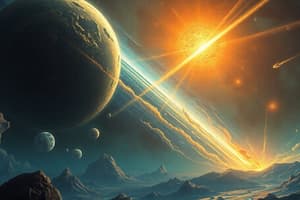Podcast
Questions and Answers
If most falls are stony meteorites, why are most finds iron meteorites?
If most falls are stony meteorites, why are most finds iron meteorites?
- Stony meteorites look more like Earth rocks. (correct)
- Stony meteorites are less weather-resistant. (correct)
- Iron meteorites are easier to find.
- Iron meteorites are more abundant.
How do observations of meteor showers reveal one of the sources of meteoroids?
How do observations of meteor showers reveal one of the sources of meteoroids?
The radiants of meteor showers are at locations where Earth crosses the debris trail of comets.
What evidence do we have that some meteorites originated inside large bodies?
What evidence do we have that some meteorites originated inside large bodies?
The Widmanstätten patterns in iron meteorites indicate very slow cooling.
Which type of meteorite is rich in volatiles and thus provides the best samples of the solar nebula?
Which type of meteorite is rich in volatiles and thus provides the best samples of the solar nebula?
Of the following, which type of meteorites comes from undifferentiated bodies?
Of the following, which type of meteorites comes from undifferentiated bodies?
What do we suspect was the heat source that melted planetesimals that were as small as 20 km in diameter?
What do we suspect was the heat source that melted planetesimals that were as small as 20 km in diameter?
What evidence do we have that meteorites are pieces of recently broken planetesimals?
What evidence do we have that meteorites are pieces of recently broken planetesimals?
How can most meteors be cometary if most, perhaps all, meteorites are asteroidal?
How can most meteors be cometary if most, perhaps all, meteorites are asteroidal?
What causes the Kirkwood gaps of the asteroid belt?
What causes the Kirkwood gaps of the asteroid belt?
What is the most likely source of the Apollo-Amor objects?
What is the most likely source of the Apollo-Amor objects?
What is similar for the asteroids of a Hirayama family?
What is similar for the asteroids of a Hirayama family?
Where are the objects in the Oort cloud thought to have been formed initially?
Where are the objects in the Oort cloud thought to have been formed initially?
How do different types of meteorites match up to the main asteroid classes?
How do different types of meteorites match up to the main asteroid classes?
Why do we believe that comets are loosely consolidated, fluffy mixtures of ice and rock?
Why do we believe that comets are loosely consolidated, fluffy mixtures of ice and rock?
Which of the following is true about long-period comets?
Which of the following is true about long-period comets?
Which of the following is true of the impact suspected to have caused the extinction of the dinosaurs?
Which of the following is true of the impact suspected to have caused the extinction of the dinosaurs?
Of the following, which is a major flaw with the falling-comet hypothesis for the Tunguska event of 1908?
Of the following, which is a major flaw with the falling-comet hypothesis for the Tunguska event of 1908?
Which type of meteorite is the most common to find?
Which type of meteorite is the most common to find?
Which type of meteorite is the most common to fall?
Which type of meteorite is the most common to fall?
Which of the following is a true statement?
Which of the following is a true statement?
What is the major source of meteor shower meteoroids?
What is the major source of meteor shower meteoroids?
How can the major source of meteor shower meteoroids be determined?
How can the major source of meteor shower meteoroids be determined?
What is the origin of most meteors?
What is the origin of most meteors?
What is the origin of most meteorites?
What is the origin of most meteorites?
How can the origin of meteors and meteorites be determined?
How can the origin of meteors and meteorites be determined?
Why are stony meteorites better represented in Antarctic finds than in finds elsewhere?
Why are stony meteorites better represented in Antarctic finds than in finds elsewhere?
What evidence is there that some meteorites originated inside larger objects?
What evidence is there that some meteorites originated inside larger objects?
What kinds of meteorites represent the evidence that some meteorites originated inside larger objects?
What kinds of meteorites represent the evidence that some meteorites originated inside larger objects?
Flashcards are hidden until you start studying
Study Notes
Meteorites, Asteroids, and Comets
- Most falls are stony meteorites, but most finds are iron meteorites due to stony meteorites being less weather-resistant and resembling Earth rocks.
- Meteor showers' radiants reveal sources of meteoroids, located where Earth crosses comet debris trails.
- Widmanstätten patterns in iron meteorites indicate slow cooling, suggesting some meteorites originated inside large bodies.
- Carbonaceous chondrites are rich in volatiles, providing the best samples of the solar nebula.
- Chondrites come from undifferentiated bodies; they are primitive and have not undergone significant changes.
- Short-lived radioactive isotopes like aluminum-26 are suspected as the heat source that melted small planetesimals (around 20 km wide).
- Evidence shows that meteorites are pieces of recently broken planetesimals.
- Despite most meteorites being asteroidal, most meteors can be cometary.
- Kirkwood gaps in the asteroid belt are formed due to orbital resonances with Jupiter, affecting asteroid distribution.
- Apollo and Amor objects are likely ejected asteroids from the Kirkwood gaps, as their orbits are unstable.
- The Hirayama families of asteroids share common origins and physical properties, grouping them together based on similarities.
- Objects in the Oort cloud are believed to have formed near the orbits of Uranus and Neptune.
- Asteroids can be categorized into three classes based on their infrared reflectance spectra: C-type (carbonaceous chondrites), S-type (most common stony meteorites), and M-type (iron meteorites).
- Comets are considered loosely consolidated mixtures of ice and rock due to their structure and behavior.
- Long-period comets exhibit randomly inclined orbits, differing from those of short-period comets.
- The impact that likely caused the extinction of the dinosaurs left a significant crater in northern Yucatan.
- A flaw in the falling-comet hypothesis for the Tunguska event is that small comet bodies would vaporize high in the atmosphere, rather than impacting the ground.
- Iron meteorites are the most commonly found type, whereas stony meteorites are the most commonly fallen.
- Despite being the most common meteorite type, stony meteorites are hard to find on Earth due to their resemblance to terrestrial rocks.
- The major source of meteoroids in meteor showers is comets, evidenced by tracking meteoroid origins back to comet orbits.
- Most meteors originate from comets, while most meteorites derive from asteroids.
- The origin of meteors and meteorites can be determined through observation and analysis of their characteristics.
- In Antarctica, ice flow concentrates meteorites, making stony meteorites easier to find on the ice compared to soil elsewhere.
Studying That Suits You
Use AI to generate personalized quizzes and flashcards to suit your learning preferences.





